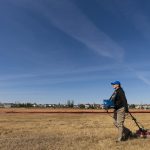Dr Kisha Supernant (University of Alberta)
Archaeology in colonial contexts has long been associated with extractive practices, where the materials, landscapes, and bodies of Indigenous people and other marginalized communities were seen as specimens and objects of study. The long-standing and ongoing critique of archaeology by Indigenous and other systemically excluded voices has led to changes, but the harmful legacy of past research has not always been adequately addressed. In this talk, I explore how archaeologists can consider research as service to reorient their work toward reclamation and restorative justice that redresses the harms done by past practice. Drawing on case studies from my own work with Indigenous communities in Canada, I demonstrate how taking a heart-centred approach can transform archaeology from an extractive practice to a restorative one and create a safer, more just future for the discipline and for the world.
Dr Kisha Supernant, a Métis/British scholar, serves as the Director of the Institute of Prairie and Indigenous Archaeology and a Professor in the Department of Anthropology at the University of Alberta. Her research focuses on Métis archaeology, digital archaeology, and heart-centred archaeological practice. Dr Supernant collaborates extensively with Indigenous communities in western Canada, emphasising ethical research relationships and Indigenous rights to cultural heritage.
Her work integrates Indigenous ways of knowing into archaeological processes, from excavation to interpretation. Using Geographic Information Systems (GIS) and remote sensing, she supports Indigenous communities to tell their stories and reclaim their cultural heritage. She leads the Exploring Métis Identity Through Archaeology (EMITA), a collaborative research project which takes a relational approach to exploring the material past of Métis communities, including her own family, in western Canada. Dr Supernant has also been at the forefront of using technology to locate and protect unmarked graves near residential schools over the past several years.
Her scholarly contributions include peer-reviewed journal publications, co-edited books, media interviews, and knowledge mobilisation initiatives. She is the Chair of the Canadian Archaeological Association’s Working Group on Unmarked Graves, which received the 2024 Governor General’s Innovation Award. Dr Supernant’s achievements led to her induction into the Royal Society of Canada’s College of New Scholars, Artists, and Scientists in 2021, and she received the Dorothy Killam Fellowship in 2023


